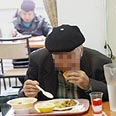
Poll: Violence more worrisome than corruption
Social Strength Index indicates concerns over growing violence, increasing worry about economic future. Some 62% of Israelis fear they will not be able to grow old with dignity; 60% troubled they may be economically dependent on others
Growing violence worries Israelis more than corruption and poverty. The many murder cases and violent incidents over the past year have made violent crime the most worrisome subject for Israelis, according to the 2009 Social Strength Index that will be presented at the Sderot Conference for Society.
In addition, there has been a sharp rise in the percentage of Israelis concerned that they will not be able to provide for their families in the future and those concerned they will not be able to grow old with dignity.
The poll taken this year shows that 81% of Israelis think violence in society is the most concerning issue as opposed to just 73% in 2008. This bumped corruption out of first on the list of most concerning issues, though it did see a slight increase from last year's 79% to 80% this year.
Poverty and the gap between rich and poor was ranked third on the list of worrisome topics with 79%, up from 61% in 2008. The continued struggle with the Palestinians is fourth on 2009's list with 71% in 2009 as opposed to 74% on the previous year's index.
Some optimistic figures were also registered. Some 62% of Israelis are proud of the State of Israel, as opposed to just 52% in the 2008's index. Fifty-three percent of Israelis believe that the State will always protect them, up from 42% last year.
On the other hand, only 35% of the respondents said they believe Israel is likely or very likely to ensure a good future for their children. Some 74% of respondents said they would not move out of the country even if they had the means to do so. On the other hand, 68% said that Israel is the best country for Israelis to live in, as opposed to 79% in last year's poll.
71% concerned they will not be able to save money
The economic situation is worrisome and affects many people. According to the statistics, 21% of Israelis said that their economic situation allows them to live in very bad conditions, or simply to survive and somehow get through the month.
The minimum salary necessary for maintaining a minimal lifestyle according to the respondents is NIS 8,319 (about $2,204) net per month. Twenty percent of the respondents said that their family's income allows them a standard of living lower or much lower than acceptable. The monthly income perceived as providing an acceptable standard of living is NIS 12,754 (about $3,379).
Some 71% of Israelis said they are worried they will not be able to save enough money for the future. This is a 10% increase some 2008 and a 24% increase since 2007. Not being able to grow old with dignity worries 62% of Israelis, as opposed to 57% last year and 47% two years ago. The percentage of Israelis concerned they will be economic dependent on someone else also jumped up from 50% in 2008 to 60% in 2009.
In addition, 59% of Israelis are worried they will not be able to provide for their families in the future as opposed to just 51% in 2008.
On a more optimistic note, 64% of Israelis believe the State allows its residence reasonable health care when needed.
Who do we trust?
Political parties are ranked the lowest on the list of people Israelis trust with 42% of Israelis who do not trust them (as opposed to 36% in 2008 and 46% in 2007). Following them are the police with 41% of Israelis who do not trust them (as opposed to 46% in 2008 and 42% in 2007). The Histadrut Labor Federation is in third in terms of lack of public trust with 39%.
Some 38% of the respondents said they do not trust the local authorities; 38% said they do not trust the media. The banks fared worse in 2009 than in previous years, jumping up from eight to fifth place with 37% of respondents reporting that they do not trust the banks.
On the other hand, 82% of Israelis said they trust their friends and family. Some 60% trust the IDF and the defense establishment as opposed to just 56% in 2008 and 45% in 2007.
President of the Sderot Conference for Society, Maj. Gen. (res.) Uzi Dayan said, "The State leadership must take immediate action to advance activities for socio-economic rescue. In order to win in the battle facing us – the terror attacks and rockets against citizens of the country, the Iranian nuclear threat, and attempts to delegitimize Israel – a strong and well-trained military is not enough. We need a strong and united society as well."
The 2009 Social Strength Index was measured during the month of October and is based on polls taken in November in the past five year. The polls are identical save for small differences in the makeup of the questionnaire. This year's poll was carried out via telephone interview of 555 respondents making up a representative sample of the adult population in Israel. The interviews were conducted in Hebrew, Russian, and Arabic.










